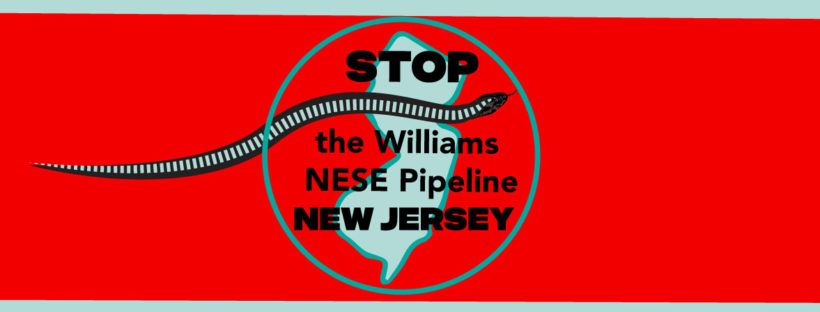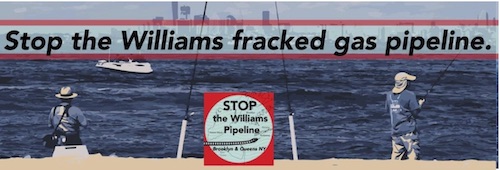We know that there is no way for Williams/Transco to build NESE’s pipeline and compressor station without
threatening our water quality, threatened & endangered species, and wetlands. We will continue to fight this
dangerous and unnecessary project to the end.
The NESE Project has been stopped twice in New York and twice in New Jersey when 2017 and 2018 applications for permits were withdrawn and/or denied. Now, following the third applications in June 2019, it’s time for the NJDEP to deny the permit applications with prejudice (a.k.a. “for good”).
YOUR COMMENTS ARE NEEDED!
Many of the concerns of people in NJ & NY have been heard, and they need to be voiced again about the 2019 permit
applications.
NJDEP has issued a comment period for the June 2019 applications that ends on August 2, 2019. We’re asking for an
extension but, at this time, we do not know if it will be granted.
Attached are sample written comments/points that are relevant to the NJDEP’s current review of applications as well as political points (such as climate change impacts).
We will be adding additional sample comments to the website as we go, so please check back periodically.
Recommendations:
- Write separate comments for each topic or point.
- Using the attached comment statements, you could do a “word search” for a topic or concern of interest to you.
- On the next page is a list of the attached comment topics with provided information.
- Choose points from what is provided on the attached comment ideas/points & use them to create your own individual comments by copying/pasting what you want to use into a Word document. Save it.
- Include your full name and address at the end of all comment letters.
- Send each comment as an attachment (the Word document or that document saved as a PDF) via one email to all of the following – the 2 NJDEP people reviewing the permit applications (Project Managers) while copying others in the DEP who are involved as well as the Governor. (Emails are listed below so that you can copy & paste them into your email.) You could also copy your local State Senators and Representatives.
Send Emails = To NESE Project Managers at NJDEP:
Stephen.Olivera@dep.nj.gov
Joslin.Tamagno@dep.nj.gov
cc:
Commissioner@dep.nj.gov
Ruth.Foster@dep.nj.gov
Christopher.Jones@dep.nj.gov
Diane.Dow@dep.nj.gov
Ginger.Kopkash@dep.nj.gov
Constituent.relations@nj.gov
5. For the Subject of your email, copy & paste this into the space –
Comments on NESE – Program Interest # 0000-01-1001.3; Activity #s: LUP 190001 & LUP190002
6. To identify the comment in the document you will attach, write something like the following as your email message:
Dear Mr. Olivera and Ms. Tamagno:
I would like to thank the DEP for its June 5, 2019 denial of Williams/Transco’s prior set of Land Use permit applications. Transco’s new Land Use permit applications – submitted merely one week after the denial – still fail to satisfy the applicable New Jersey statutes and regulations, including New Jersey’s stringent requirements for issuing a Water Quality Certificate under Section 401 of the federal Clean Water Act.
For accountability, public participation, and use of science-based decision-making, the following comments are provided for consideration during the current comment period for the June 2019 applications by Williams/Transco for the following permits for the proposed Northeast Supply Enhancement Project: Freshwater Wetlands Individual Permit with Section 401 Water Quality Certification, Flood Hazard Area Individual Permit and Verification, Waterfront Development Individual Permit with Section 401 Water Quality Certification, and Coastal Zone Management Act Consistency Determination.
However, this 30-day timeframe is inadequate because the application material is only available for review during business hours in paper format, and this precludes true accessibility for those who cannot spend time at the Municipal Center or NJDEP’s office for reasons that include work, family care and/or disability.
Thus, in addition to considering my comments, I am asking for (a) an extension of the comment period for an additional 45 days beyond August 2 for sending you comments as well as (b) posting of the application material in a web-accessible format on the DEP website. This should not be difficult since Williams/Transco provided the DEP with all application material on a DVD in late June/early July.
7. Then, attach your comment as a Word document or PDF.
Comment Topics – Elaborated Points are in the attached dociments.
(1) Construction of the NESE Project threatens water quality, increased stormwater flooding, and threatened & endangered species.
OPEN PDF OF COMMENT 1
A. Construction of a stormwater basin at the proposed Compressor Station 206 site does not include complete plans that account for the specific soil type that exists there.
B. Impacts to the habitat for the State threatened barred owl as well as protected vernal pool habitats at the proposed Compressor Station 206 site were not adequately assessed or avoided.
C. Construction Schedule of the Raritan Bay Loop was reduced from 12 months to 7 months
D. A shortened timeline increases the intensity of work, so the overall impacts will be magnified.
E. Noise Impacts from Pile Drivings – It is not clear if the construction schedule for these activities has changed with the compressed construction schedule for the Raritan Bay Loop, but the requests for harassment have increased.
F. Dredging up toxics has not been avoided by construction of the Raritan Bay Loop, and this will likely cause long-term harm that was not accounted for in the applications.
G. To reach a conclusion that the impacts on water quality would be short-lived, temporary and localized neglects to consider the unusual tidal flows in Raritan Bay, the chain-reactions from destroyed habitat and food sources for marine life, and the contamination of food sources for marine life and people.
H. NESE’s Raritan Bay Loop’s Undisputed, Devastating Impact on Shellfish Beds and Benthic Communities
I. Williams/Transco has not sufficiently identified permanent, temporary, and secondary/indirect impacts from onland construction, and they have not shown plans to avoid and/or mitigate these impacts.
- Acid Producing Soils
- Construction through or near Superfund Sites & other toxic sites
(2) Williams/Transco did not demonstrate that there are no practicable alternatives to avoid impacting exceptional resource value wetlands and their transition areas.
OPEN PDF OF COMMENT 2
(3) Williams/Transco did not demonstrate a “compelling public need” for the NESE Project that meets requirements of NJ’s Freshwater Wetlands Protection Act Rules at N.J.A.C. 7:7A-10.4 or, alternatively, demonstrate an extraordinary hardship from denial of a permit.
OPEN PDF OF COMMENT 3
The NESE Project does not serve an essential health or safety need of the municipality in which it would be constructed, and its proposed use does not serve existing needs of residents of the State.
- Air Quality & Health Impacts
- Safety Risks – Fires or Explosions
Additionally, the “need” for the NESE Project has been refuted by reports, and the needs of the State that are currently focused on fighting climate change impacts would be harmed by the NESE Project despite claims by Williams/Transco about “benefits” to New Jersey.
(4) NESE is not in the Public Interest.
OPEN PDF OF COMMENT 4
- need to preserve natural resources
- relative extent of the public and private need for the regulated activity
- practicability of using reasonable alternative locations and methods
- economic value
- ecological value of the freshwater wetlands and probable impact on public health and fish and wildlife.
(5) Contaminants that would be unearthed, suspended and redistributed in the Raritan Bay exceed “acceptable” levels. Exceedances were found by the NYSDEC for heavy metals (copper & mercury) in New York waters, too. Thus, construction of the Raritan Bay Loop of the NESE Project would (a) negatively impact surface water quality, and (b) harm threatened and endangered species and their habitat. Additionally, the shortening of the in-water construction schedule raises serious concerns about impacts from increased vessel traffic and noise as well as adhering to time-of-year restrictions to protect threatened and endangered species if the schedule needs to be altered due to unforeseen circumstances. Furthermore, the unique tidal flows in the Raritan Bay do not seem to have been given appropriate consideration.
OPEN PDF OF COMMENT 5
(6) Other Concerns about In-Water Construction
- Time of Year Restrictions
- Thermal Discharges
OPEN PDF OF COMMENT 6
(7) There is a Questionable “Need” for additional natural gas in National Grid’s NY area.
OPEN PDF OF COMMENT 7
(8) There is no real consideration of climate crisis-mitigating renewable alternatives by the Federal or State agencies. Additionally, the impact of the NESE Project on climate change effects should be considered in light of the threats facing New Jersey as well as the State’s goals to reduce greenhouse gases.
OPEN PDF OF COMMENT 8
(9) Misleading and incomplete information in the Factsheets provided by Williams/Transco
OPEN PDF OF COMMENT 9


